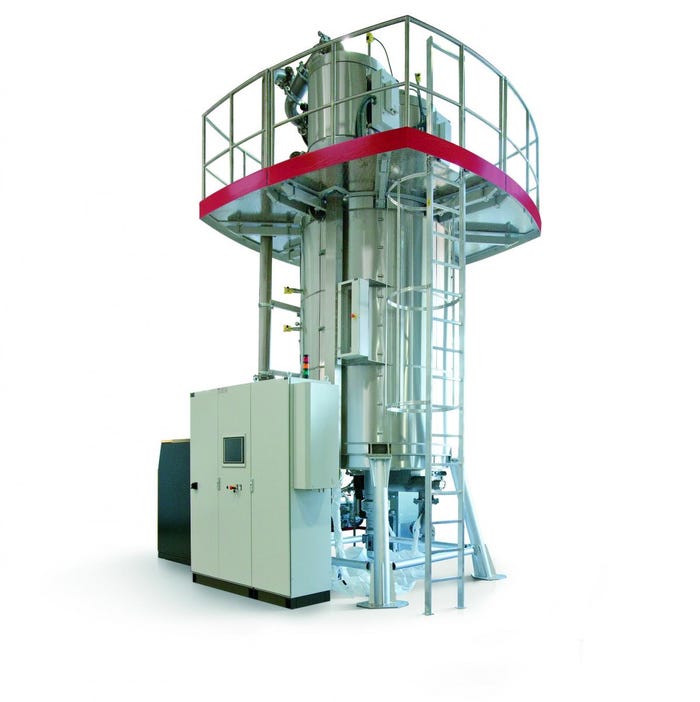Starlinger viscotec producing food-grade PCR HDPE flakes
Austrian company Starlinger viscotec has received FDA approval for its deCON decontamination dryer to make food-grade flakes from post-consumer recycled HDPE (high density polyethylene) milk bottles.The deCON enables the re-use of PCR HDPE for food packaging applications under conditions E through G.
July 24, 2012
Austrian company Starlinger viscotec has received FDA approval for its deCON decontamination dryer to make food-grade flakes from post-consumer recycled HDPE (high density polyethylene) milk bottles.
The deCON enables the re-use of PCR HDPE for food packaging applications under conditions E through G.
Lisa Straub, manager of Food Safety for Starlinger viscotec, told PlasticsToday the deCON was developed in 2007. Whereas the company's Starlinger SSP reactor is mainly used for decontamination and IV increase of PET pellets such as strapping, bottle-to-bottle, etc., the deCON was used to decontaminate post-consumer PET flakes and PIR (post-industrial regrind).
Straub said the deCON has only been used for PET materials, simply because there hadn't been any customer requests regarding other polymers. Last year, a customer asked the company about the possibility of recycling HDPE milk bottles in order to use the recyclate again for milk and juice bottles, yogurt containers, and meat trays.
Due to its higher diffusion and sorption behavior, PCR HDPE faces even stricter safety criteria than PCR PET, the company stated. Hence, a prerequisite for the production of food grade HDPE is a strictly defined input material stream. 
"Knowledge of polymer contaminants and their migration behavior play a major role in food grade recycling," Straub said. "On the one hand, HDPE is less inert than PET, meaning HDPE absorbs higher amounts of post-consumer substances. On the other hand, HDPE containers are very often used for personal care products and detergents and therefore contain non-food substances and aromas."
The cleaning efficiency of the deCON HDPE recycling process was determined by doing a challenge test, she said. A certain amount of artificially contaminated HDPE material was introduced into the recycling process, without dilution with non-contaminated material. The amount of highly contaminated material used and the applied input levels of the challenge test substances presented a worst-case scenario.
"The result of the challenge test and migration tests clearly show that the migration potential of the post-consumer recycled HDPE is in a similar range like virgin HDPE," she said.
Cleaning efficiencies of around 99.9% are achieved.
The "super-clean" rHDPE flakes can be used for containers for fresh milk, juices, meat trays, and similar products.
rHDPE is a promising market within the food packaging industry, Straub said.
The annual recycling study from Recoup showed that 76% of HDPE milk bottles consumed and collected in the UK during 2010 were recycled. However, despite the sustained rise in the number of HDPE milk bottles being recycled, an estimated 22,700 tonnes of HDPE milk bottles were still landfilled in 2010.
In the U.S., collection of HDPE bottles increased by 2.5 million pounds, according to the 2010 U.S. National Post-Consumer Plastics Bottle Recycling Report, published by the Association of Postconsumer Plastic Recyclers (APR) and the American Chemistry Council (ACC). However, the HDPE bottle-recycling rate only raised to 29.9% in 2010, compared to 29.2% in 2009.
"Most notably in markets where supermarkets have a very strong position within the supply chain there is a clear trend toward increasing the recycling content of the packaging materials," Straub said. "Partially, supermarkets have already set minimum levels for the recycling content in food packaging in their supplier guidelines."
Starlinger viscotec has already sold two deCON modules for food grade recovery of PCR HDPE.
"The premise of Starlinger viscotec is 'food grade without compromise,'" Straub said. "As long as post-consumer bottle flakes, either PET or HDPE, pass the deCON before they are introduced into a sheet extrusion line or another production extruder, consumers can be sure that the super-clean recyclate is safe and meets the food-grade standards of EFSA and FDA."
About the Author(s)
You May Also Like


